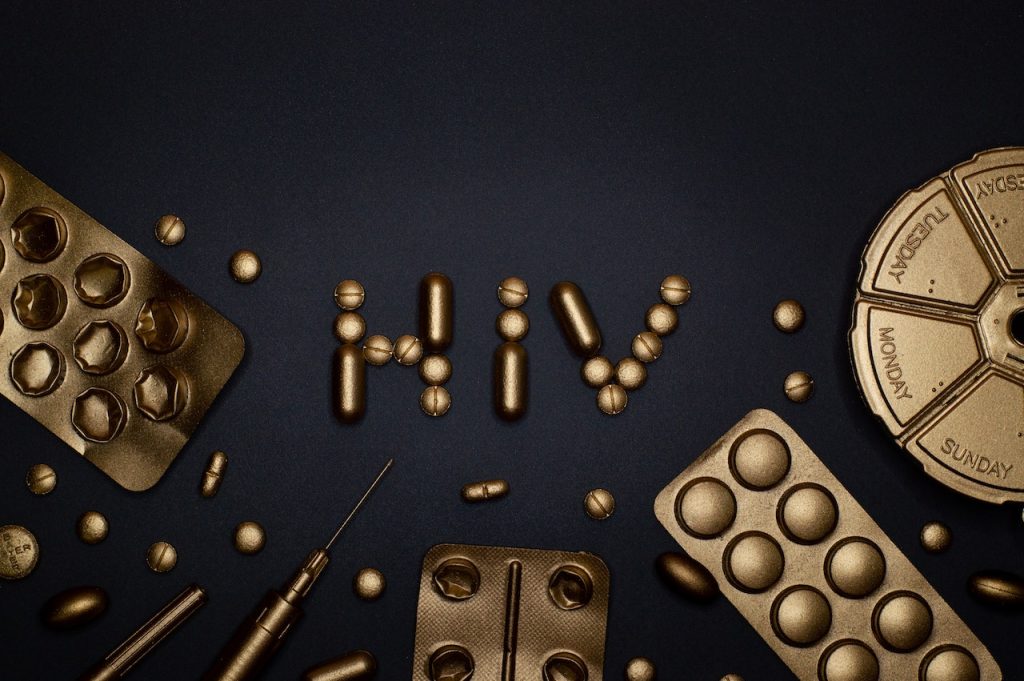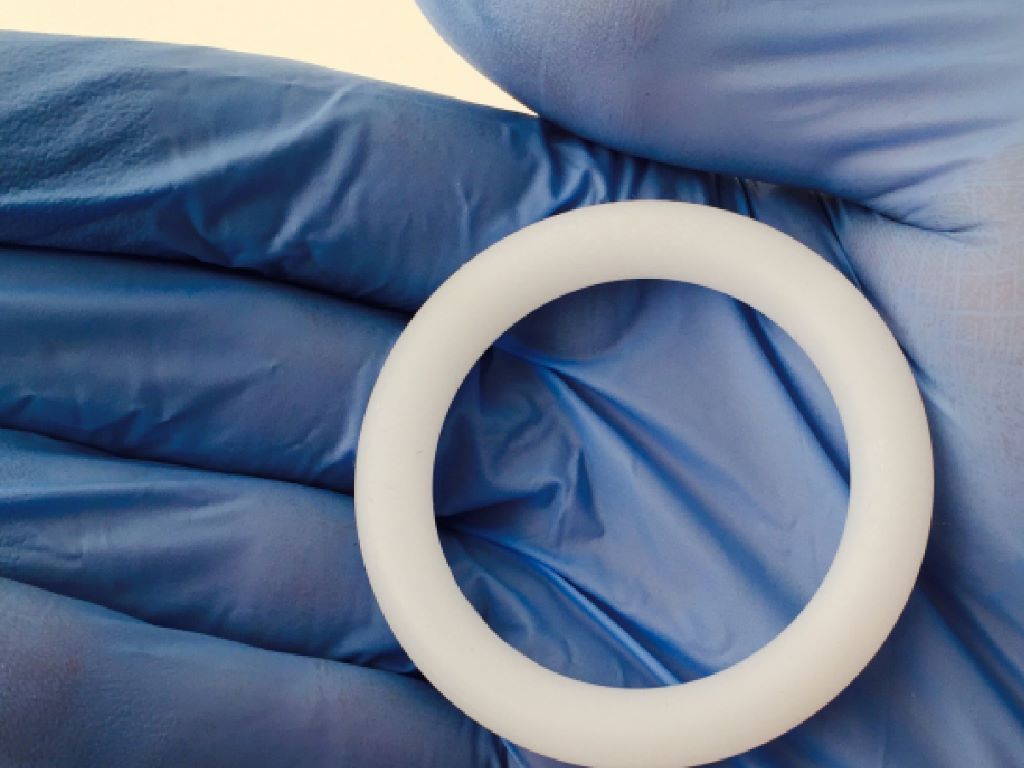By Catherine Tomlinson for Spotlight

A company headquartered in Johannesburg will start making flexible silicone rings to protect women from HIV. The move signals a strong vote of confidence in an African firm to supply the ring at adequate scale and affordable prices, and a crucial step to making the continent self-reliant, reports Catherine Tomlinson.
A South African company has secured the rights to manufacture a vaginal ring used to prevent HIV infection. The ring, which is inserted and removed by the user, provides protection for a month, after which it has to be replaced with a new ring. The ring contains an antiretroviral drug called dapivirine.
While studies show that the dapivirine vaginal ring is less effective at preventing HIV than HIV prevention pills and injections, it has benefits over other tools that have led the World Health Organization (WHO) to recommend its inclusion in the package of sexual health services available to women.
One advantage of the ring over HIV prevention pills is that it can be used discreetly by women, allowing users to use the ring without having to negotiate or discuss its use and purpose with their sexual partners. This is particularly important in the context of South Africa where women face high rates of gender-based violence, which erodes their autonomy over their bodies and sexual and reproductive health.
“We need to give women more control over their health and bodies and access to a range of safe and effective options, including the dapivirine ring, to choose from so they can decide to use what works best for them at different times of their lives,” wrote several prominent women African activists in 2022.
Limited access
While the WHO recommended that the ring is offered to women, its current price is a barrier to broad use and rollout in South Africa. The only dapivirine vaginal ring approved by the South African Health Products Regulatory Authority that is currently available in the country is called the DapiRing.
The DapiRing is manufactured by a Swedish company, Sever Pharma Solutions, under a licence from the Population Council (formerly the International Partnership for Microbicides). It can be bought in South Africa’s private sector for R320, excluding dispensing fees.
The DapiRing is not available in South Africa’s public sector outside of study and pilot sites, as the National Essential Medicines List Committee, the body that determines which health technologies should be available in the country’s public health facilities, determined that the product is unaffordable at its current price. They estimate that the product will become affordable for South Africa’s public sector at a threshold price of R52 per ring.
Local company to boost access
The Population Council, the entity that owns the intellectual property on the dapivirine vaginal ring, selected South African pharmaceutical company Kiara Health to manufacture and supply the ring across Africa.
Kiara Health’s CEO, Dr Skhumbuzo Ngozwana, told Spotlight that while it is not yet known what the price of the Kiara manufactured ring will be, it is expected to be lower than the current price of the Swedish-manufactured DapiRing.
Licensc to manufacture
The council told Spotlight that the initial focus of the licence and partnership will be to develop manufacturing capacity at Kiara Health to supply the dapivirine vaginal ring across Africa. In the long term it is hoped that Kiara will be able to serve markets outside of Africa where there is a need for the ring.
The Population Council’s selection of an African-based manufacturing partner is notable as holders of intellectual property protections on HIV health technologies have typically sought out companies in Asia, and India in particular, as manufacturing partners.
Professor Linda-Gail Bekker, CEO of the Desmond Tutu HIV Foundation, told Spotlight: “If the “COVID-19 pandemic taught us anything, it is the value of being self-reliant as a region – being able to manufacture the vaginal ring is a step closer to Southern African self-reliance.”
Ngozwana said that Kiara Health appreciates that the Population Council have bucked the trend by not going to the East. “[A]ll these new technologies tend to go to the East, but instead they’ve partnered with an African company”.

He added that future technology transfers to other manufacturers in Africa may be pursued if there is a need.
Exclusive supply licence
The Council told Spotlight that it intends to pursue an exclusive supply licence with Kiara Health for the sole supply of the dapivirine ring in Africa. The pursuit of an exclusive supply licence is a strong vote of confidence by the Population Council in the ability of Kiara Health to supply the ring at adequate scale and affordable prices.
Since Kiara Health’s exclusivity is for the supply of the ring, if there is a need, the company will be able to supply a dapivirine vaginal ring that is made by the Population Council’s Swedish manufacturing partner, Sever Pharma Solutions, that is already widely authorised for use in countries in Africa.
This would also guard against supply shortfalls that sometimes occur when only one manufacturer supplies a market, doctor Brid Devlin, the Population Council’s chief scientific officer, told Spotlight. “We would have two registered manufacturers right out the gate to guard against any shortfalls and have the opportunity to continue the supply as the demand grows.”
Why Kiara Health was chosen
Devlin added that the Population Council did not have a formal bid process through which Kiara Health was selected as the manufacturing partner for the ring, but rather that Kiara Health was selected following years of engagement with the company.
“We had a team that went to Kiara last year to see this site and it was a really impressive operation, both in terms of the staff but also the entire manufacturing operation,” she said.
Ngozwana told Spotlight that Kiara Health has existing manufacturing facilities in Johannesburg where capacity to produce the ring will be established.
Kiara Health’s manufacturing facilities already hold the quality assurance certifications (cGMP certification) required to manufacture medicines and have adequate space in Johannesburg to establish and scale manufacturing capacity for the ring, Ngozwana told Spotlight.
What is needed to manufacture the ring locally?
Critical steps include technology transfer, securing financing, procuring and importing manufacturing equipment, developing validation batches, and seeking regulatory approvals.
At this stage, there are still unknowns regarding the extent of data and testing that will be required to gain regulatory approval of Kiara Health’s dapivirine vaginal ring. To aid regulatory authorisation, Ngozwana and Devlin noted that Kiara Health would use the same manufacturing technology and inputs, including active pharmaceutical ingredients (API) used by Sever Pharma Solutions. This will require Kiara Health to import manufacturing equipment and API from Europe.
However, in the long term, Ngozwana said that Kiara Health would hope to increasingly procure manufacturing inputs, including potentially dapivirine API from the Pretoria-based API manufacturer CPT Pharma. (Spotlight previously reported on CPT Pharma’s work on API production here).
Ngozwana and Devlin told Spotlight that the anticipated time-limiting factors for establishing manufacturing capacity are securing financing and procuring and importing manufacturing equipment.
Funding has long been a challenge for African-based pharmaceutical companies since it has historically been scarce and only available on unfavourable terms. However, Ngozwana told Spotlight that Kiara Health is already engaging potential funders for support and exploring different financing sources, including grants and debt instruments.
Ngozwana and Devlin noted that technology transfer, which is a process for transferring manufacturing skills and knowledge, has already begun.
Can this license boost further domestic manufacturing capacity?
While vaginal rings are a relatively new type of health technology, they have multiple potential applications. A vaginal ring to prevent pregnancy has been available since the early 2000s and work is underway to develop a ring that is effective in combating both HIV and pregnancy. A dapivirine ring that reduces one’s risk of contracting HIV for three months – as opposed to one month – is also under development.
Kiara Health will seek to position itself to manufacture other vaginal rings entering the market, Ngozwana said. He added that in the long term, the company hoped that the partnership with the Population Council will be broadened to allow for local manufacturing of other sexual and reproductive health technologies in their product portfolio.
Republished from Spotlight under a Creative Commons licence.
Source: Spotlight

